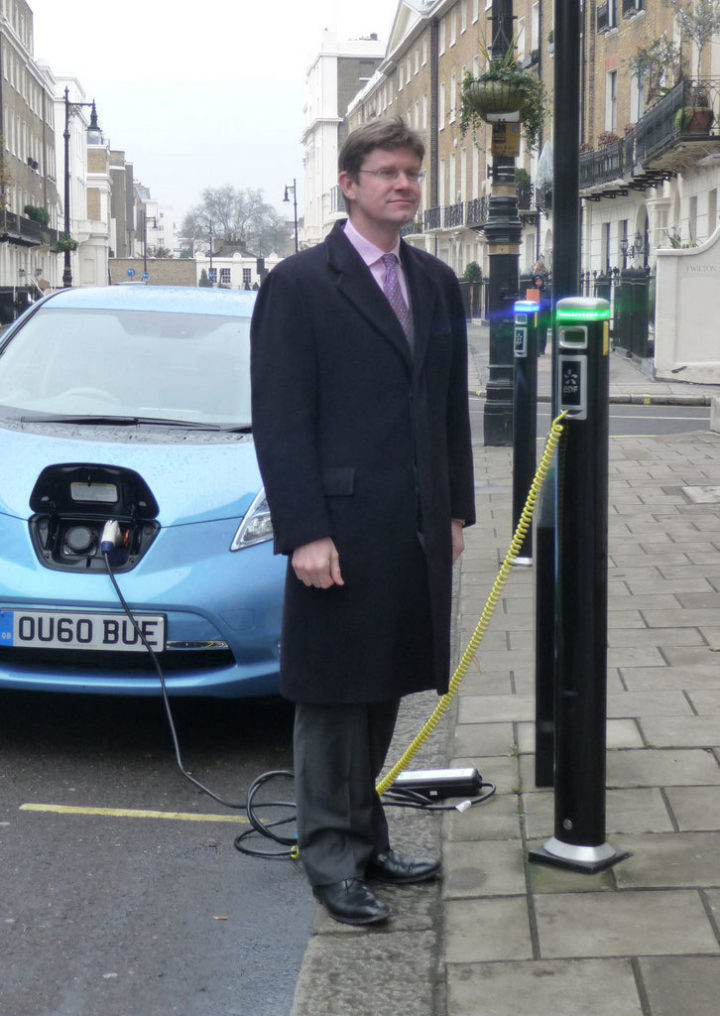The positives and negatives of a battery economy
If an electric vehicle revolution arrives in the UK, what will be the effects?
By Matt Finch
Share
Last updated:
No one likes getting told off. My two year old hates getting taken to task. I hate it when the boss rebukes me. And I can’t imagine the Department for Transport (DFT) particularly liked the big, public slap on the wrist it received recently. The Environmental Audit Committee (EAC) released a fairly damning report saying that the DFT needs to get its act together. Quickly. Why? They think that the DFT has fallen asleep at the wheel, and believe the uptake of ultra-low emission vehicles, including electric vehicles (EVs), is just too slow. But EV take up is steadily increasing and the technology is improving daily, which begs the question: if the EV revolution arrives quicker, what effects will it have?
All electric
The rapid uptake of electric vehicles in the UK is startling: there are now around80,000 on our roads, up from 2000 just five years ago. This figure is likely to increase further as technology develops and old cars are taken out of service - the average age of a car on UK roads is7.6 years old. There remains a significant mountain to climb, however, with36.7 million vehicles using the roads in total.
But it’s worth keeping in mind that there is a large push towards EVs. EAC criticism aside, Government policy means that when you buy a new EV, it is subsidised by up to £4500. They also subsidise the installation of charge points at home - to the tune of 75% of the total cost. 72% of motorway service stations in England now have at least 1 EV charge point. There are now 40 different EV models available for purchase, up from just 11 five years ago. Underpinning this shift is Committee on Climate Change analysis that shows that the UK needs 60% of new cars and vans to be electric by 2030 to meet our 2050 climate change targets - targets that all political parties strongly support. Of course, there are detractors: OPEC expects just 6% of the world’s passenger cars to be running on oil substitutes by 2040, while Exxon forecasts of EV penetration arecharacteristically downbeat.
So EVs are coming. Their en masse arrival will probably not be a slow and gradual change, but a very definite quick flip - when the electric economics trump petrol economics, when the infrastructure is in place, when the actual range on all but the smallest EV is over 200 miles, and when the car manufacturers are only producing EVs, it simply won’t make sense to buy petrol cars. Their sales will fall off a cliff.
No-one can accurately predict when this will happen, although Bloomberg New Energy Finance have stated that EVs will be cheaper than conventional vehicles by 2022 (if the price of oil recovers to around $60). Regardless of oil price, they do forecast a steady increase in EV-driven miles, contrary to the current trend ofsteadily fewer miles driven per car per year in the UK since 2008. So expect the tipping point to occur sometime in the 2020s - exactly when today’s brand new cars start being scrapped.
Most of what has been written about EVs falls into two categories. It’s either technical (“energy storage to torque? 90%? Wow!”) or environmental (“Think of the carbon savings!”). But we haven’t heard too much about the social and macroeconomic effects, positive and negative. And that would be useful, as surely as a society we want to enhance the positives and lessen the negatives?
Less maintenance. Fewer jobs?
EVs have vastly fewer moving parts than their oil burning cousins. Fewer moving parts means less maintenance, and that means fewer garages and mechanics. There are just over 38,000 garages in the UK, employing just over 200,000 staff. Indeed, the AA attended 3.4m breakdowns in year ending March 2016. Put bluntly, these figures will be decimated in the next decade. Fewer breakdowns can only be a good thing, but lots of out-of-work mechanics is certainly not. This is the visible face of car maintenance though. The (current) automobile supply chain will also be affected. From gearboxes and exhaust systems to lowly petrol caps and gear sticks, they will all not be needed. Instead, a new supply chain will rise. Battery (and by extension, lithium) companies are the obvious winners, but specialist auto technology companies will also emerge. That the changes will be dramatic is a given. What remains to be seen is how much of the UK motor vehicle industry's estimated £60 billion turnover (which equals a whopping 12% of the UK’s overall manufacturing turnover) will remain in the UK.

The car industry isn’t just garages and spare parts though. The motor manufacturing industry employs 142,000 people (2013 figures). Seven out of 11 Formula 1 teams are headquartered here (including ‘French’ Renault and ‘German’ Mercedes). Indeed, UK motorsports in total employs 41,000 people. (One to ponder: will Formula 1 - currently running on unleaded petrol, switch to electric vehicles? Or will the F1 razzmatazz simply switch to Formula E?) Even the RAC employs around 4,000 staff. Of course, none of these jobs needs to go, but a lot of them (engineers, mechanics, designers, etc.) will have to change and therefore some wholesale retraining is needed. Changing the entire value chain architecture associated with the construction, running and scrapping of gasoline vehicles will face some industrial and public opposition. Whether governmental support to retrain these workforces is needed remains to be seen.
Sshhhh, EVs are good for you
Of course, one of the most initially disconcerting EV effects is the noise - or lack of it. Quieter streets can only be a good thing, although less car noise will probably lead to more media concern around the increase in individuals who gets knocked over - because they didn’t hear the car coming. Quieter streets could also change that bastion of middle-class dinner parties - the obligatory house price chat. Houses on a main road should go up in value vis-a-vis the back streets. Those houses will no longer be the frontline of noise and air pollution. But whilst noise pollution is just annoying, air pollution is deadly serious.
There are an estimated 29-50 thousandearly deaths that are caused by air pollution each year, caused in part by diesel cars and vans (but to stress, NOT all). It goes without saying that electric cars don’t produce any tailpipe emissions. The World Health Organisation estimated that this costs the UK around £54 billion a year in economic costs, although a more recent report suggests the cost is “just” £20 billion a year. The report specifically says that those who “live, learn or work near busy roads….suffer the most harm”.

Lining parts of those busy roads are some of the UK’s 8,500 petrol stations. Petrol station numbers have been falling for decades. There were 19,000 stations in 1990, and a whopping 37,500 in 1970. Conversely, the number of public EV charge points is growing quickly, and analysis by Nissan predicted that charge points would overtake petrol stations by 2020 – although this doesn’t consider that a single petrol station can refuel many cars, while a charging point is limited to just one at a time. This leads to an interesting effect. Range Anxiety, or the worry that you will run out of fuel (electrons or petrol) before being able to get to more, is the current scourge of the EV industry. Their production focus is to build cars that can travel further on a single charge (analogous to increasing fuel efficiencies across conventional vehicles). However this worry could flip to petrol cars owners as more and more petrol stations close due to lack of business. This in turn means it would make more and more sense to swap to an EV. A vicious or virtuous circle, depending on your point of view.
Winners and losers
Fewer petrol stations means less petrol sold, which also means the amount taken in fuel excise duty will be slashed. This currently stands at 58p/litre, which resulted in £27.6 billion being taken in the last tax year - a handy amount that is roughly 4% of total central government spending (estimated to be £611 billion in fiscal year 2017). Road tax (or vehicle excise duty, to give it it’s official, pompous name) take will also be decimated, although previous Chancellor George Osborne changed the rules in 2015, meaning that from next year ALL vehicles that cost over £40,000 will pay at least £310 per year. Currently though, any EV is exempt from paying road tax. Expect this to change. How to replace those fuel excise duty pounds is anyone’s guess though.

And finally, switching cars away from oil to electric obviously produces big winners and losers in the energy sector. National Grid (winner!) will have to source and supply all the additional electricity needed (with renewables and nuclear companies at the front of the low-carbon queue to provide this), whereas the oil majors (losers!) will have to absorb the loss of the 123 million litres of fuel that UK cars consume every day. The supermajors - BP and Shell - would be able to absorb the loss of the UK market easily, although they wouldn’t like it (and neither would our pensions. A whopping 6% of all pension scheme investments are in coal, oil and gas companies). However there are lots of smaller UK focussed companies in the oil supply chain whose existence is threatened. It’s not just oil though - the whole energy sector itself may be disrupted with the arrival of millions of energy storage units, as the providers of the units, wrapped up inside EVs, are rapidly becoming the experts in energy storage technology. Indeed, some car companies have already made the move into household energy.
These are just the tip of the iceberg. The effects of such a seismic shift will reverberate across the UK, and will be watched closely, especially by the newly-formed Department for Business, Energy and Industrial Strategy, which recently praised the automotive sector.
The Treasury will also be keeping a close eye on developments. They obviously want to know whether UK Plc ends up as a net winner or loser in the EV revolution. Because if we are on the brink of not just a transport revolution, but also an energy revolution, then Post-Brexit Britain needs to take full advantage of it. And the DFT will obviously be watching the rise of EVs closely, if only to get an A* next time from the EAC.
Share